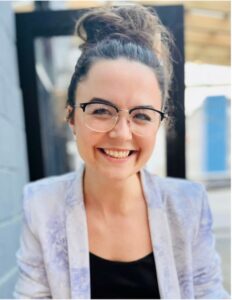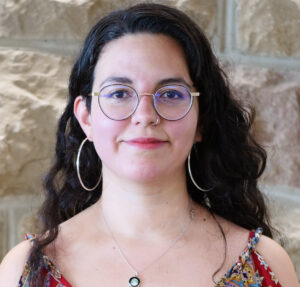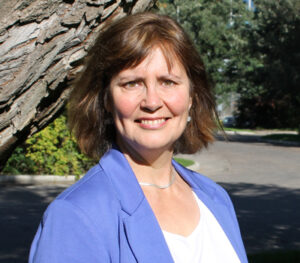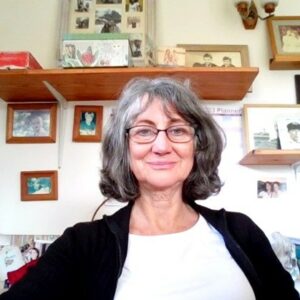Reflecting on PECS-III session S3: Embedding equity and justice in social-ecological systems: case studies from the Global South and North
Authors: Michaela Sidloski, Mariana Campos Rivera, Sheona Shackleton, & Maureen G. Reed
Photo by Mariana Campos Rivera
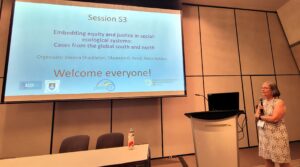
This blog post is part of a series reflecting on a selection of sessions and keynotes that were presented at the PECS-III Conference, Montreal Canada, 12-15 August 2024
The question asked at our PECS-III symposium boils down to this: we recognize and agree that equity and justice are central elements of well-functioning social-ecological systems (SES), but how do we embed these principles into research and practice? In short: what does it look like to do equity and justice in our work? We engaged with this question by presenting case studies conducted in diverse geographic, social, and ecological contexts (Botswana, Canada, Gabon, Ghana, Kenya, Mexico, and South Africa). This was followed by audience questions and a discussion to synthesize overarching themes that emerged from the cases presented. This reflection is framed around eight key themes. Credit for the synthesis of these themes goes to Drs. Sheona Shackleton and Maureen G. Reed.
Theme 1: Advancing equity in SES research and practice requires critical reflexivity and explicit attention to ethics. One way to achieve this is through co-developing principles around how to work in collaborative research settings. Dr. Maureen Reed provided many examples of how conventional Research Ethics Boards’ processes can be barriers to effective and equitable transdisciplinary research, posing the question: “Are research ethics boards more concerned to protect institutional liability than researcher-community relationships?”. Michaela Sidloski also suggested that to advance equity in transdisciplinary research contexts, ethical and critical reflexive practice is required from all collaborators who engage in knowledge co-production processes and not only from those affiliated with an academic institution.
Theme 2: Relational approaches and frameworks are promising tools for embedding equity into SES research and project implementation. For example, based on interviews with adaptation practitioners in Ghana, Kenya, and South Africa, Dr. Sheona Shackleton identified the importance of adopting relational approaches to supporting equity, respect, and trust in local climate change adaptation projects.
Theme 3: Process is more important than product (the means cannot be separated from the ends). Many of the presenters discussed the centrality of processes – considerations of equity must be embedded from the beginning of all research and practice, and these considerations may affect how the process unfolds. Focusing on the process allows collaborators to innovate, adapt, and build capacity.
Theme 4: Willingness to revise methods and project design in small and big ways can yield richer results and better relationships. Michaela Sidloski and Dr. Sheona Shackleton highlighted that by meaningfully embedding equity into their work, SES researchers can learn to embrace emergent processes and findings, welcome surprise, and reflect on how the research is developing.
Theme 5: Contextualization is essential. Explicit and critical attention to social, political, cultural, and institutional dimensions of people and place is necessary to identify constraints to equity, which vary across settings. Drs. Petra Holden and Glynis Humphrey examined constraints to achieving social equity in nature-based solutions projects in Botswana, Gabon, and South Africa. They found that while a typology of common constraints could be formulated, how constraints manifested or were avoided was heavily dependent on local social, cultural, and political context.
Theme 6: SES researchers must recognize the value of Indigenous and local knowledge (ILK) and traditional ecological knowledge (TEK). All the presenters emphasized the importance of diverse knowledge systems in working towards greater equity. This included recognizing and respecting the validity of these knowledges, but also developing research methods and processes built upon ILK and TEK.
Theme 7: The role of youth and the importance of intergenerational equity remains overlooked in SES scholarship. Mariana Campos Rivera illustrated this by examining the barriers and facilitators of youth engagement in Indigenous knowledge and community-based governance in rural Oaxaca, Mexico.
Theme 8: Explicit attention to the intersections among social identity factors that contribute to marginalization and privilege helps to prevent the homogenization of groups. Michaela Sidloski’s research in northern Canada demonstrated how applying an intersectional lens in a community climate change vulnerability assessment and adaptation planning process allowed the community to engage with the complex ways in which gender, age, culture, spirituality, racialized identity, socioeconomic status, and other social identity factors work together to inform power dynamics in local decision-making.

